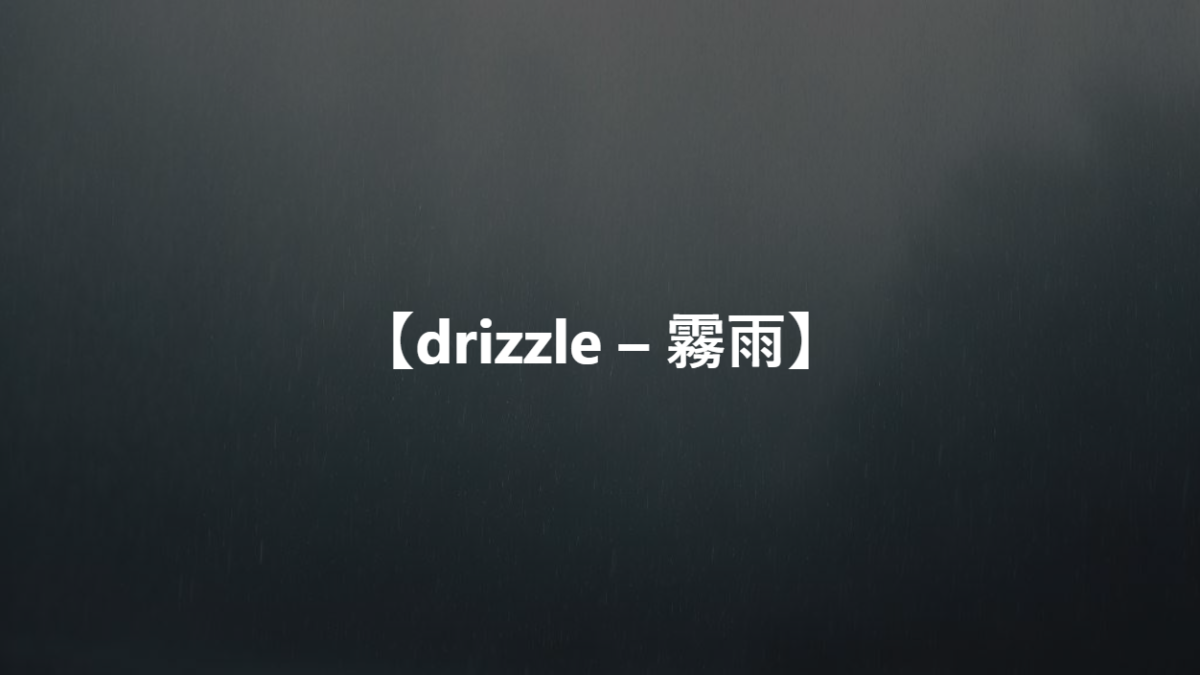語源・類義語・反対語・例文
【Drizzle – 霧雨】という単語の語源とか由来を知っていますか?
「Drizzle」(霧雨)という単語は、古英語の「drēosan」から来ており、「落ちる」「垂れる」「失敗する」という意味があります。この用語は時を経て進化し、16世紀には特に小雨を指すようになりました。現代の「drizzle」の意味である軽い、一定の雨としての使用は、1500年代半ば頃に言葉の中で現れ始めました。動詞形である「軽く雨が降る」ことを意味する用法は16世紀後半から使われており、名詞形である軽い雨を指す用法は少なくとも17世紀初頭から使用されています。この単語は、軽くて一定に降る小雨の音と動作を模倣したものと考えられています。
The word “drizzle” comes from the Old English word “drēosan,” meaning “to fall,” “to droop,” or “to fail.” The term evolved over time and, by the 16th century, had come to refer specifically to light rain. The modern sense of “drizzle” as a light, steady rain began to appear in the language around the mid-1500s. The verb form, meaning “to rain lightly,” has been used since the late 16th century, and the noun form, referring to light rain, has been in use since at least the early 17th century. The word likely mimics the sound and the action of light rain falling softly and steadily.
この単語の類義語・反対語を教えてください。
類義語:
- Mist (もや): 軽い霧や細かい水滴で視界が曇る状態を指しますが、霧雨と似た湿度の高い状態を示します。
- Sprinkle (霧雨、散水): 非常に軽い雨や水滴が散らばることを指します。
- Light rain (小雨): 弱い雨や少量の雨を表しますが、drizzleと同じように穏やかな降雨を示します。
- Mizzle (薄霧雨): 霧と霧雨の中間的な状態を指す、特に英国英語で使われる言葉です。
反対語:
- Downpour (豪雨): 大量の雨が短時間に降り注ぐ状態を指します。
- Deluge (土砂降り): 大量の雨が激しく降ることを指します。
- Torrential rain (集中豪雨): 短時間で大量に降る非常に激しい雨を表します。
- Drought (干ばつ): 雨が長期間降らない、乾燥した状態を指します。
この単語に似た単語で間違いやすい単語はありますか?
- Mist (もや): 「Mist」は、軽い霧を指すため、「drizzle」と混同されることがあります。しかし、「mist」は空中に浮かぶ水滴が視界をぼやけさせる状態を指し、実際には雨ではありません。
- Sprinkle (散水): 「Sprinkle」は軽い雨や水をまく行為を指しますが、「drizzle」と比べて断続的であったり、強度が異なることがあります。
- Dew (露): 「Dew」は、夜間に冷えた地表や物体の表面に形成される水滴を指しますが、雨や霧雨とは異なり、大気から直接降るものではありません。
- Mizzle (薄霧雨): 「Mizzle」とは、非常に細かい雨、特に霧と雨の中間的な状態を表すことがありますが、一般的には「drizzle」よりも少し強いか、霧の要素が強いです。
この単語を使った例文を5つほど教えてください。
I forgot my umbrella and got caught in a drizzle on my way home.
傘を忘れて帰り道で霧雨に降られてしまいました。
The drizzle created a serene and misty atmosphere in the forest.
霧雨が森に静かで霞んだ雰囲気を作り出しました。
We decided to have a picnic despite the drizzle, enjoying the coolness and tranquility it brought.
霧雨が降っていたにもかかわらず、涼しさと静けさを楽しみながらピクニックをすることにしました。
The drizzle turned into a heavy shower, forcing us to seek shelter under a tree.
霧雨が激しいにわか雨に変わり、私たちは木の下で避難することになりました。
I love the gentle drizzle on a spring morning; it feels refreshing and soothing.
春の朝に軽い霧雨が降るのが好きです。さわやかで心地よい感じがします。
【drizzle – 霧雨】のコロケーション
- Light drizzle (軽い霧雨): この表現は非常に軽い雨降りを指し、しばしば空気が湿った感じを与えるが、大量の雨水はもたらさない状態を描写します。
- Persistent drizzle (続く霧雨): 長時間にわたって一定して降り続く、中断することのない霧雨を指します。この状態は、しばしば天気が悪い日に経験されます。
- Drizzle turning to rain (霧雨が雨に変わる): 霧雨が次第に強くなり、通常の雨降りに変わる過程を表します。このコロケーションは、天気の変化を示す時に使われます。
- Drizzle and fog (霧雨と霧): 霧雨と霧が同時に発生している状況を表します。この組み合わせは、特に視界を低下させ、湿度が高い環境を作り出します。
- Wet with drizzle (霧雨で濡れる): 物や人が霧雨によって湿っている状態を指します。この表現は、霧雨が十分な量であると、表面に水滴を残すことができることを示します。
「drizzle – 霧雨」という表現に関連するいくつかの典型的なコロケーションについて説明します。これらの組み合わせは、霧雨がもたらす特有の雰囲気や天候の状態を詳細に描写するのに役立ちます。
まず、「Light drizzle」は、非常に軽い霧雨を指します。この状態では、空気は湿っていますが、地面が大量の雨で濡れることはありません。通常、このような霧雨は、穏やかで静かな雰囲気をもたらし、外出時には傘を使わずとも快適に過ごせることが多いです。
次に、「Persistent drizzle」は、絶え間なく降り続く霧雨を表します。この霧雨は数時間または一日中続くことがあり、外出する際には持続的な小雨に対処する必要があります。この種の霧雨は、しばしば灰色で曇った空と関連しています。
「Drizzle turning to rain」という表現は、霧雨が徐々に強くなり、最終的には通常の雨に変わる天気の変化を示します。このコロケーションは、天気予報や日常会話で、天候の変化を説明する際に使われます。
「Drizzle and fog」は、霧雨と霧が同時に発生している状況を描写します。この組み合わせは、特に視界が低下し、湿度が高く、神秘的または幻想的な雰囲気を生み出すことがあります。
最後に、「Wet with drizzle」というフレーズは、霧雨によって物や人が濡れている状態を表します。この表現は、霧雨が持続している場合に、衣服や物の表面に細かい水滴がつく様子を示します。
これらのコロケーションは、「drizzle – 霧雨」という言葉を使った、様々な気象条件やその影響を具体的に表現するのに役立ちます。それぞれの状況に応じて、霧雨が周囲の環境や人々の感情にどのように影響を与えるかを理解するのに適しています。
Let’s explain some typical collocations related to the expression “drizzle ” which help in depicting the unique atmosphere or weather conditions brought by drizzle.
First, “Light drizzle” refers to very light rainfall. In this condition, the air is moist but the ground does not become saturated with rain. Typically, this kind of drizzle brings a calm and quiet ambiance, and one can comfortably be outdoors without the need for an umbrella.
Next, “Persistent drizzle” describes a ceaseless, ongoing light rain. This kind of drizzle can last for hours or the entire day, necessitating preparations for continuous light rain when going outside. This type of drizzle is often associated with grey and overcast skies.
The expression “Drizzle turning to rain” indicates a weather change where the drizzle gradually strengthens and eventually turns into regular rainfall. This collocation is used in weather forecasts or everyday conversation to describe changes in the weather.
“Drizzle and fog” depict a situation where drizzle and fog occur simultaneously. This combination can significantly reduce visibility, increase humidity, and create a mystical or ethereal atmosphere.
Lastly, the phrase “Wet with drizzle” indicates that objects or people have become wet due to the drizzle. This expression shows the appearance of fine water droplets on the surfaces of clothes or objects when the drizzle persists.
These collocations are useful for precisely expressing various weather conditions and their impacts using the term “drizzle “. They are appropriate for understanding how drizzle affects the surrounding environment and people’s emotions, depending on the situation.
文法問題: “drizzle” (霧雨)
- 品詞と使い方:
A light _________ fell throughout the day, making the streets slick and the air damp.
(A) drizzled
(B) drizzling
(C) drizzle
(D) drizzles
解答と解説:
(C) drizzle 空欄には主語となる名詞が必要です。drizzle は「霧雨」という意味の不可算名詞です。
– - 動詞形:
It started to _________ as we were leaving the house, so we grabbed our umbrellas.
(A) drizzle
(B) drizzled
(C) drizzling
(D) drizzles
解答と解説:
(A) drizzle 空欄には動詞が必要です。drizzle は「霧雨が降る」という意味の動詞で、ここでは過去形が適切です。
– - 類義語:
The weather forecast predicted a _________ for the afternoon, so we decided to postpone our picnic.
(A) drizzle
(B) mist
(C) sprinkle
(D) all of the above
解答と解説:
(D) all of the above drizzle, mist, sprinkle はいずれも「霧雨」やそれに近い意味の言葉で、この文脈ではすべて適切です。
– - 反意語:
The _________ turned into a downpour, soaking everyone who was caught outside.
(A) drizzle
(B) sunshine
(C) clear skies
(D) all of the above
解答と解説:
(A) drizzle 文脈から、空欄には drizzle の反意語が入ることがわかります。ここでは、霧雨が「大雨」に変わったという対比を表すため、downpour が適切です。
– - 誤文訂正:
The drizzles made the roads slippery, so we drove cautiously.
解答と解説: drizzles → drizzle drizzle は不可算名詞なので、複数形の drizzles は誤りです。

